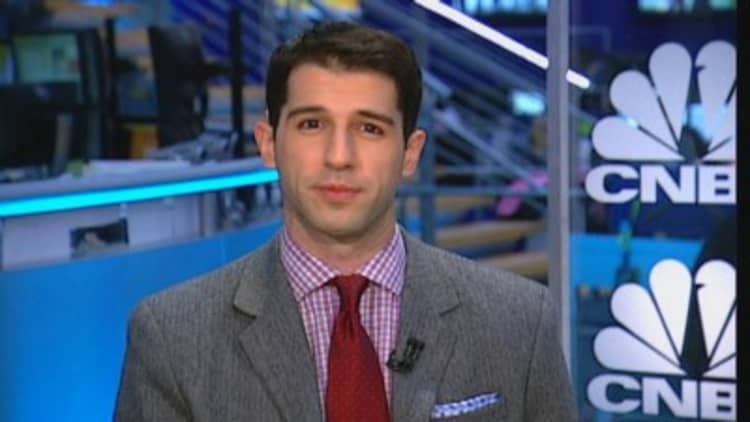
Most of the talk in the hedge fund industry has been around two hot strategies this year. Those executed by stock-focused managers like Jeffrey Altman's Owl Creek Asset Management and Larry Robbins' Glenview Capital Management who rode the bull market to relatively easy gains. And those played out by outspoken activists like Dan Loeb's Third Point and Barry Rosenstein's JANA Partners who shook up boards—and sometimes each other.
But it was distressed investors, who usually bet on the bonds of beaten up or bankrupt companies, who produced the juiciest returns in 2013.
The Absolute Return Distressed Index—an average of the performance of more than 100 hedge funds who use the strategy—is up 13.28 percent through November. That's better than benchmarks for U.S. equity (12.50 percent); event driven or activists (12.02 percent); and global equity (11.33 percent), according to hedge fund news and data tracker Absolute Return.
Some of the best distressed funds over the year have been David Tepper's Appaloosa Management Palomino Fund (up 38.3 percent); John Paulson's Credit Opportunities Fund (up 20.08 percent through November); and Davidson Kempner's Distressed Opportunities Fund (up 18.28 percent), which is managed by Anthony Yoseloff, Avi Friedman and Conor Bastable. The performance figures are from a report by HSBC's Alternative Investment Group.
Top hedge fund strategies in 2013
| Strategy | Jan-Nov perf. |
|---|---|
| Distressed | 13.28% |
| U.S. Equity | 12.50% |
| Event Driven | 12.02% |
| Global Equity | 11.33% |
| Technology | 9.53% |
| Multi-Strategy | 9.12% |
| Credit | 8.49% |
| Mortgage Backed Sect. | 8.24% |
| Composite | 7.21% |
| Fixed Income | 6.54% |
| Convertible & Equity Arb | 5.11% |
| Mixed Arbitrage | 4.40% |
| LatAm Equity | 2.24% |
| Macro | 1.00% |
| Managed Futures | -1.49% |
| LatAm Debt | -4.59% |
| Commodities | -9.38% |
Source: Source: Absolute Return
(Read more: No letup on risk for hedge funds this December)
"Of all the grades of credit, defaulted bonds have logged the strongest performance in 2013," said Charles Stucke, chief investment officer of Guggenheim Investment Advisors.
"QE liquidity has certainly buoyed these assets, but that's not the entire story," he said. "Post re-org equities have done really well, and it's precisely the distressed investments owned in these situations which drove truly exceptional performance at some of the most clever credit managers."
The Absolute Return Distressed Index rose each month this year from January to November, except for June, when the average manager fell 1.14 percent.
(Read more: This could be the next big thing for hedge funds)
Stock-focused hedge funds, of course, had a big year too.
Owl Creek's flagship fund, which buys up cheap of so-called value stocks, is up 42.54 percent through Dec. 6. Glenview's main fund is up 38.99 percent through November. And Leon Cooperman's Omega Advisors' main fund rose 25.19 percent through November. All figures are from the same HSBC report.
"Clearly, there are some equity long/short funds that maintain a significant long bias and were able to ride the beta train," said Rick Teisch, director of research for North America at $2 billion fund of hedge funds Liongate Capital Management.
"I think the bigger story, though, is that many equity long/short funds that run with low net exposure—i.e., plus 35 percent or less—were able to generate highly attractive returns in the mid-teens and 20s."
(Read more: Hedge funder: Nothing will curb markets)
Activists and so-called event driven managers—who play big changes at companies to make money—also had a good year amid all the media attention they got.
Nelson Peltz's Trian Fund Management's main fund is up 35.92 percent through Dec. 6, according to HSBC. The JANA Nirvana Fund is up 25.64 percent through November, according to investor materials. And Third Point is up 22.4 percent over the same period, according to fund documents.
Troy Gayeski, partner and senior portfolio manager at $9 billion fund of hedge funds SkyBridge Capital, said there were several drivers for that strong performance.
One is the improving economy giving corporate management teams the ability to pay back shareholders through stock buybacks, increased dividends or mergers and acquisitions.
"We have seen an increase in corporate events that provide event driven equity managers hard catalysts to drive value creation and profitable investment opportunities," Gayeski said.
Another reason for the profits was the overall rise in the stock market, which allowed most managers to keep their portfolios in risk-on mode and capture the increases in the companies' value.
Gayeski said event driven strategies would keep doing well. "We believe that these drivers will continue to be abundant in 2014 which is why event driven equity funds remain our largest thematic exposure for the next 6 to 12 months," he said.
SkyBridge has money with JANA, Paulson, Third Point and others, according to a recent Securities and Exchange Commission disclosure.
(Read more: Here's another activist fund having a huge year)
Not all hedge funds were so shiny.
The Absolute Return Composite Index is up 7.21 percent through November. It was dragged down by lagging strategies like commodities (down 9.38 percent on average); Latin American debt (down 4.59 percent); and managed futures (down 1.49 percent).
—By CNBC's Lawrence Delevingne. Follow him on Twitter @ldelevingne.






